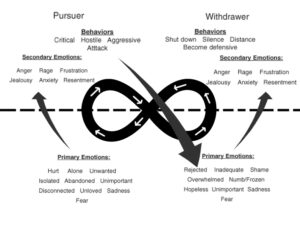Why should we explore premarital counseling?
Congratulations on your engagement! This is such an exciting, albeit stressful time for couples. Premarital Counseling is the perfect avenue to invest in your future together. At Cycles Couples Counseling, we've found it's a lot easier to proactively treat couples, than it is to retroactively repair years of damage. Think of what you'll learn in premarital counseling like your emotional insurance policy. Couples therapy sessions will help you and your partner get your marriage started off on the right foot. Don't wait till things fester. Get support while problems are small.
We don't argue. Why do we need therapy?
Premarital Counseling isn't just for couples in trouble. It's a way for you and your partner to deepen your bond and have support navigating the foundational pieces of your relationship. Our team of clinicians are trained to prompt you to confront big topics and give you the tools to help you find resolution and a solid game plan going forward. The insight you'll learn in premarital counseling sessions will prepare you to navigate a lifetime of highs and lows with your partner.
Five Things You'll Learn In Premarital Counseling
1. What are our attachment styles?
Attachment Styles are the way you interact in your relationship. They are formed in early childhood between children and their caregivers. These behaviors show up most prominently in times of distress. You'll learn in premarital counseling the ways in which you try to show up for your partner and take care of the relationship when it feels like things are going South. Knowing attachment styles can be a blueprint for understanding how each partner behaves during stress. Think of it like a "Spark Notes" translation for, "Why does my partner do that?" In Premarital Counseling, your therapist will help you and your partner find each of your attachment styles and provide some psycho-education on how this can impact how you show up in conflict and your relationship. Armed with this insight, you can better predict and navigate future conflict.
2. What is a negative cycle?
A negative cycle is a self-sustaining pattern of responses many partners find themselves looping in during times of extreme stress. While some premarital clients have already encountered this dance during conflict, others may have little experience. Through premarital counseling you will have an ability to catch early signs of pursuit and withdraw that could be problematic in the future. Using Attachment Theory research, your EFT therapist will help you to navigate secure responses to each other during times of conflict, rather than getting into a push-pull dynamic. Research shows secure couples feel comfortable in times of closeness and distance and display less reactivity and more flexibility navigating these shifts.

3. How does our past affect our presentation now in relationships?
In premarital counseling, your therapist will guide you and your partner in exploring your relationship past, AKA your attachment history. Your caregivers in childhood were your first teachers in how to be a human in relationship with others, so it makes sense that their interactions are fundamental. In these sessions, you will begin to see how certain patterns of behaviors were valuable to your partner in their attachment history. Knowing this can better predict future behavior or even soften the translation of the "Why do they do that?!" line of questioning. Chances are, what behaviors worked in the past will be repeated in the future until someone decides they no longer serve them.
4. How do we navigate dynamics of wedding planning?
Wedding planning brings up lots of stress. There are many factors that go into planning your special day. While your therapist might not weigh in on your ceremony specifics, they can help you to consider different aspects of your values, relationship, family and culture. Premarital counseling is also a great place to process stressful interactions or upcoming big decisions. Your therapist can help you to steer clear of negative cycle dynamics and have more effective planning conversations with your partner.
5. How do we tackle difficult conversations like finances, family planning and religion?
For many couples these subjects weren't as important earlier in their dating relationship. However, as marriage approaches and couples consider the family life they're creating together, these values and norms can begin to surface in a more prominent way. In premarital counseling, you'll learn how to effectively privilege your views without getting into a reactive posturing with your partner. How you want to do life together is up to you two, the way you go about these decisions is where we can help. Your premarital therapist might broach difficult topics like these and hold a mirror up to you and your partner about which part of your conversations are not relational or collaborative. This will give you both an opportunity to reflect and clarify your position in a way that invites curiosity and responsiveness rather than shut down or criticism.
Why do we need to learn this in premarital counseling? Can't we do this on our own?
You're right. There are a lot of great resources online and in print that can help couples prep for their future together. We recommend many of them on our resources page! Your therapist's goal is to help you to be self-sufficient so you don't need couples therapy as a married couple. They're essentially trying to talk themselves out of a job.
What you'll learn in premarital counseling isn't meant to take away from any independent research you want to do on your own, it's meant to compliment it! Engaging in this growth with an Emotionally Focused trained Couples Therapist will ensure you have the support you need when issues arise. Think of us like your bumper rails when you go bowling. With enough practice and support, you'll be able to navigate your lives together without negative cycles or future expensive months of couples therapy.
Interested in hearing more about premarital counseling? Schedule a free phone consultation today!
Learn more about premarital counseling in California.


